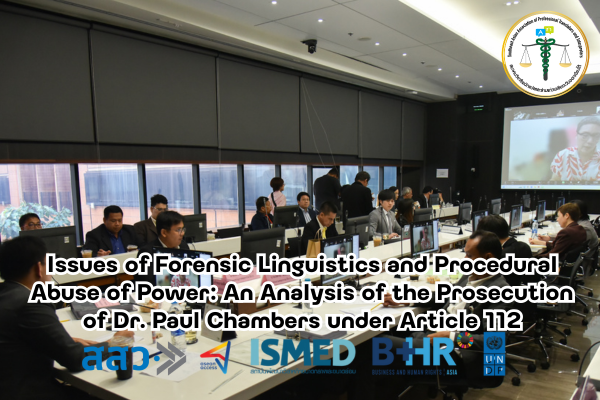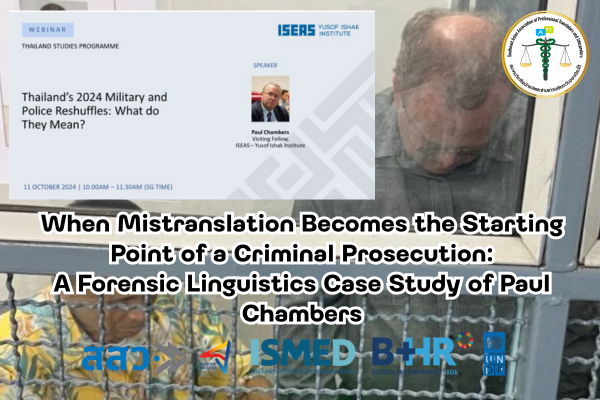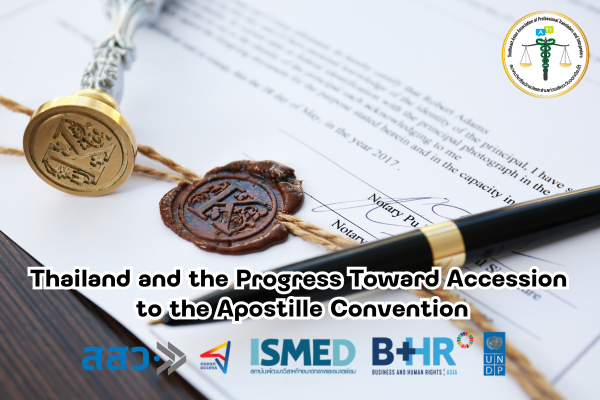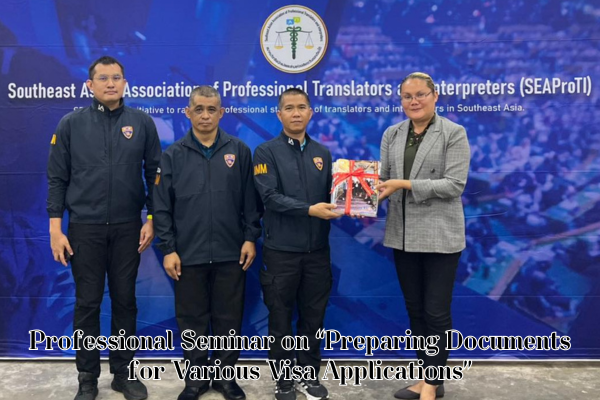The Crucial Role of Interpreters in Bridging Cultures and Languages
29 December 2024, Bangkok – In an increasingly interconnected world, interpreters serve as the invisible thread weaving together people, cultures, and ideas. Far from merely converting words from one language to another, interpreters are cultural mediators who bridge linguistic and cultural divides, capturing not only the literal meanings of words but also the emotions, intentions, and nuances behind them. Their work is vital in ensuring effective communication in a multitude of contexts, from healthcare and business to legal and diplomatic settings.
Bridging Language Barriers
At the heart of interpreting lies the responsibility of facilitating communication between individuals who do not share a common language. In diverse settings such as hospitals, courtrooms, and international boardrooms, interpreters enable clear, mutual understanding. This prevents costly misunderstandings and fosters productive collaborations.
In healthcare, for instance, interpreters play a pivotal role in ensuring that patients can articulate their symptoms accurately and understand their diagnoses and treatment plans. In such situations, the interpreter is not merely a linguistic bridge but also a lifeline, enabling healthcare providers to deliver life-saving care and improving patient outcomes.
Similarly, in business settings, interpreters are instrumental in facilitating international negotiations and partnerships. By ensuring all parties understand each other clearly, they help organizations navigate linguistic and cultural complexities, paving the way for successful collaborations in the global market.
Cultural Mediation
Interpreters do far more than translate words—they are cultural ambassadors. Every culture has unique communication styles, gestures, and norms, which can lead to misunderstandings when individuals from different backgrounds interact. Interpreters help navigate these cultural intricacies by explaining subtleties that might otherwise go unnoticed.
For example, a seemingly innocuous gesture in one culture might be offensive in another. Interpreters, with their deep cultural knowledge, bridge these gaps, fostering mutual respect and understanding. In doing so, they not only facilitate communication but also build trust, empathy, and collaboration across cultural divides.
Conveying Meaning and Emotion
The art of interpreting goes beyond conveying the literal meaning of words. Interpreters capture the speaker’s tone, intent, and emotional subtext, ensuring that the message resonates with its intended impact. This requires a delicate balance of linguistic skill, cultural insight, and emotional intelligence.
Whether mediating in a tense legal negotiation or delivering a heartfelt medical prognosis, interpreters ensure that the speaker’s full meaning and intent are conveyed. This allows for more natural and empathetic interactions, ensuring that nothing is lost in translation.
Critical Contexts for Interpreting
Healthcare Settings
In healthcare, the stakes for accurate interpretation are particularly high. Miscommunication between patients and healthcare providers can lead to misdiagnoses, improper treatment, and even fatal outcomes. Interpreters ensure that patients can accurately describe their symptoms and understand complex medical information, enabling better health outcomes and reducing health disparities for non-native speakers.
Business and Negotiations
In the global economy, interpreters are key players in facilitating international trade and partnerships. They enable clear communication in meetings, negotiations, and collaborative projects. By helping businesses overcome language barriers, interpreters allow companies to expand their operations across borders, fostering innovation and economic growth.
Legal Proceedings
In the realm of justice, interpreters uphold the principle of equal access to the legal system. They ensure that individuals who speak different languages can fully participate in legal proceedings, whether as defendants, witnesses, or plaintiffs. This is crucial for upholding fairness and preventing miscarriages of justice in multilingual societies.
The Skillset of an Interpreter
Interpreting is a demanding profession that requires a unique set of skills and attributes. At its core, interpreters must be fluent in at least two languages and possess deep cultural knowledge. However, the role demands much more than bilingual proficiency.
- Memory and Note-Taking Skills: Interpreters must retain large amounts of information and deliver accurate interpretations, often under pressure.
- Quick Thinking and Articulation: The ability to think and speak rapidly is essential, especially in real-time interpreting scenarios.
- Specialized Vocabulary: Interpreters often work in specific fields such as medicine, law, or business, requiring mastery of industry-specific terminology.
- Concentration and Listening Skills: The ability to focus intensely is crucial for capturing every detail of the message being conveyed.
- Ethical Standards: Interpreters adhere to strict codes of ethics, including confidentiality, impartiality, and accuracy. This ensures that they remain trustworthy and professional in all situations.
Ethics in Interpreting
The ethical dimension of interpreting cannot be overstated. Interpreters must navigate complex situations while maintaining neutrality, ensuring that their personal biases do not influence the communication. Confidentiality is another cornerstone of the profession, as interpreters often deal with sensitive or private information.
The Impact and Value of Interpreters
Interpreters play an indispensable role in promoting inclusivity, fostering international collaboration, and ensuring access to vital services. By breaking down language barriers, they enable individuals to connect, understand, and cooperate, regardless of their linguistic or cultural backgrounds.
In healthcare, interpreters improve patient outcomes and ensure equitable access to medical care. In business, they drive global expansion and innovation by facilitating cross-cultural partnerships. In legal contexts, they uphold the integrity of the justice system by ensuring all parties can fully engage.
Beyond these practical contributions, interpreters also have a profound societal impact. By fostering cross-cultural understanding and empathy, they help build bridges between diverse communities. Their work promotes a more inclusive and harmonious global society, where language and cultural differences are celebrated rather than seen as obstacles.
Conclusion
In today’s globalized world, the role of interpreters has never been more critical. They are the unsung heroes who connect people across languages and cultures, enabling meaningful communication and collaboration. Their work goes beyond mere translation to encompass cultural mediation, emotional intelligence, and ethical responsibility.
As the world becomes increasingly interconnected, the demand for skilled interpreters will only continue to grow. Their contributions are not just practical but transformative, shaping a world where every voice is heard, understood, and valued. Interpreters are the invisible yet indispensable force driving communication, empathy, and cooperation on a global scale.
About SEAProTI’s certified translators, translation certification providers, and certified interpreters:
The Southeast Asian Association of Professional Translators and Interpreters (SEAProTI) has officially announced the criteria and qualifications for individuals to register as “Certified Translators,” “Translation Certification Providers,” and “Certified Interpreters” under the association’s regulations. These guidelines are detailed in Sections 9 and 10 of the Royal Thai Government Gazette, issued by the Secretariat of the Cabinet under the Office of the Prime Minister of the Kingdom of Thailand, dated July 25, 2024, Volume 141, Part 66 Ng, Page 100.
To read the full publication, visit: the Royal Thai Government Gazette
บทบาทสำคัญของล่าม: สายใยที่เชื่อมโยงวัฒนธรรมและภาษา
ในโลกที่เชื่อมโยงถึงกันอย่างลึกซึ้งในปัจจุบัน “ล่าม” เป็นเสมือนสายใยที่มองไม่เห็นซึ่งถักทอผู้คน วัฒนธรรม และแนวคิดเข้าด้วยกัน งานของล่ามไม่ได้เป็นเพียงการแปลคำพูดจากภาษาหนึ่งไปยังอีกภาษาหนึ่งเท่านั้น แต่ยังครอบคลุมถึงการเป็นผู้สื่อสารทางวัฒนธรรมที่ช่วยถ่ายทอดความหมาย เจตนา และอารมณ์ของผู้พูดอย่างครบถ้วน บทบาทของล่ามจึงมีความสำคัญอย่างยิ่งต่อการสร้างความเข้าใจและการสื่อสารที่มีประสิทธิภาพในหลากหลายบริบท ไม่ว่าจะเป็นด้านสุขภาพ ธุรกิจ กฎหมาย หรือความสัมพันธ์ทางการทูต
ขจัดอุปสรรคทางภาษา
หน้าที่สำคัญที่สุดของล่ามคือการช่วยให้ผู้คนที่พูดคนละภาษาเข้าใจกันได้อย่างชัดเจน การสื่อสารที่ไร้อุปสรรคทางภาษาเป็นสิ่งสำคัญยิ่งในหลายสถานการณ์ เช่น ในโรงพยาบาล ศาล หรือห้องประชุมทางธุรกิจ ล่ามทำให้การพูดคุยเป็นไปได้อย่างราบรื่น ลดความเข้าใจผิด และเสริมสร้างความร่วมมือระหว่างกัน
ในบริบทของการดูแลสุขภาพ ล่ามมีบทบาทสำคัญในการช่วยให้ผู้ป่วยสามารถสื่อสารอาการของตนเองได้อย่างถูกต้อง และเข้าใจการวินิจฉัยรวมถึงแผนการรักษาจากแพทย์ได้อย่างครบถ้วน สิ่งนี้ไม่เพียงช่วยให้ผลการรักษาดีขึ้น แต่ยังช่วยสร้างความไว้วางใจระหว่างผู้ป่วยและบุคลากรทางการแพทย์อีกด้วย
ในทางธุรกิจ ล่ามคือผู้ที่เชื่อมต่อโลกการค้าระหว่างประเทศ การช่วยให้ผู้เข้าร่วมการประชุมและการเจรจาเข้าใจกันได้อย่างชัดเจนช่วยให้การสร้างความร่วมมือข้ามวัฒนธรรมเป็นไปได้อย่างราบรื่น ซึ่งนำไปสู่ความสำเร็จในตลาดโลก
การเป็นผู้สื่อสารทางวัฒนธรรม
งานของล่ามไม่ได้หยุดอยู่แค่การถ่ายทอดคำพูด แต่ยังรวมถึงการเป็น “ทูตทางวัฒนธรรม” ที่ช่วยให้ผู้คนเข้าใจถึงความแตกต่างของวัฒนธรรม การสื่อสารในแต่ละวัฒนธรรมมีลักษณะเฉพาะตัว ไม่ว่าจะเป็นรูปแบบการพูด การแสดงออกทางท่าทาง หรือมารยาททางสังคม สิ่งเหล่านี้อาจสร้างความเข้าใจผิดได้หากไม่มีผู้ที่มีความรู้ความเข้าใจอย่างลึกซึ้ง
ตัวอย่างเช่น ท่าทางบางอย่างที่ถือว่าเป็นเรื่องธรรมดาในวัฒนธรรมหนึ่ง อาจถูกมองว่าไม่เหมาะสมในอีกวัฒนธรรมหนึ่ง ล่ามจึงต้องใช้ความเชี่ยวชาญในการอธิบายความแตกต่างเหล่านี้เพื่อส่งเสริมความเข้าใจและความเคารพซึ่งกันและกัน
การถ่ายทอดความหมายและอารมณ์
การแปลไม่ได้เป็นเพียงการถ่ายทอดความหมายของคำเท่านั้น แต่ยังรวมถึงการสะท้อนน้ำเสียง เจตนา และอารมณ์ของผู้พูดให้ถึงผู้ฟังได้อย่างสมบูรณ์แบบ นี่คือศิลปะของการเป็นล่าม ซึ่งต้องใช้ทักษะทางภาษา ความเข้าใจทางวัฒนธรรม และความฉลาดทางอารมณ์ในระดับสูง
ไม่ว่าจะเป็นการช่วยไกล่เกลี่ยในสถานการณ์ทางกฎหมายที่ตึงเครียด หรือการแปลคำพูดที่เต็มไปด้วยความรู้สึกในบริบททางการแพทย์ ล่ามมีหน้าที่ทำให้ผู้สื่อสารทั้งสองฝ่ายเข้าใจและสัมผัสถึงความหมายที่แท้จริงของกันและกัน
บริบทสำคัญที่ต้องใช้ล่าม
สถานพยาบาล
ในสถานพยาบาล ความแม่นยำในการแปลอาจเป็นเรื่องของชีวิตและความตาย ล่ามช่วยให้ผู้ป่วยสามารถอธิบายอาการได้อย่างถูกต้องและช่วยให้แพทย์สามารถสื่อสารคำแนะนำหรือการรักษาได้อย่างชัดเจน สิ่งนี้ไม่เพียงช่วยให้การดูแลผู้ป่วยมีประสิทธิภาพมากขึ้น แต่ยังลดช่องว่างความเหลื่อมล้ำด้านสุขภาพสำหรับผู้ที่ไม่สามารถพูดภาษาท้องถิ่นได้
ธุรกิจและการเจรจา
ในเศรษฐกิจโลกยุคใหม่ ล่ามคือกำลังสำคัญที่ช่วยผลักดันการค้าและความร่วมมือระหว่างประเทศ การช่วยให้การประชุมและการเจรจาสื่อสารได้อย่างมีประสิทธิภาพช่วยสร้างความสำเร็จในการดำเนินงานข้ามพรมแดน
กระบวนการยุติธรรม
ในระบบกฎหมาย ล่ามเป็นผู้รักษาหลักการที่ว่าทุกคนควรมีสิทธิ์ในการเข้าถึงความยุติธรรมโดยเท่าเทียมกัน การแปลอย่างถูกต้องช่วยให้ผู้พูดภาษาอื่นสามารถมีส่วนร่วมในกระบวนการทางกฎหมายได้อย่างเต็มที่ ไม่ว่าจะในฐานะจำเลย พยาน หรือผู้ร้องเรียน
ทักษะที่จำเป็นของล่าม
การเป็นล่ามไม่ใช่เพียงแค่การพูดได้สองภาษา แต่ต้องอาศัยทักษะและคุณสมบัติพิเศษอีกมากมาย ได้แก่:
- ความเชี่ยวชาญในภาษาและวัฒนธรรม: ความรู้ลึกซึ้งทั้งในด้านภาษาและวัฒนธรรมของทั้งสองฝ่าย
- ความจำและการจดบันทึกที่ยอดเยี่ยม: สามารถจดจำรายละเอียดจำนวนมากได้ในเวลาสั้น
- ความคิดและการพูดที่รวดเร็ว: โดยเฉพาะในสถานการณ์ที่ต้องแปลแบบเรียลไทม์
- ความเชี่ยวชาญคำศัพท์เฉพาะทาง: โดยเฉพาะในสาขาที่มีความเฉพาะเจาะจง เช่น การแพทย์ กฎหมาย หรือธุรกิจ
- ความสามารถในการฟังและมีสมาธิ: จดจ่อในรายละเอียดทุกแง่มุมของการสนทนา
- จริยธรรมในวิชาชีพ: รักษาความลับ ความเป็นกลาง และความถูกต้องในการทำงาน
จริยธรรมและความรับผิดชอบในงานล่าม
ล่ามต้องปฏิบัติงานด้วยมาตรฐานจริยธรรมที่สูงสุด ความเป็นกลางในการสื่อสารเป็นสิ่งสำคัญยิ่ง เช่นเดียวกับการรักษาความลับของข้อมูลที่เกี่ยวข้อง
ผลกระทบและคุณค่าของล่าม
ล่ามเป็นผู้ที่ช่วยขจัดกำแพงทางภาษา เปิดทางให้ทุกคนเข้าถึงบริการที่จำเป็น เสริมสร้างความร่วมมือระหว่างประเทศ และส่งเสริมความเท่าเทียมในทุกมิติของสังคม ไม่ว่าจะในโรงพยาบาล ห้องพิจารณาคดี หรือห้องประชุม ล่ามคือผู้ที่ช่วยให้เสียงของทุกคนถูกได้ยินอย่างชัดเจนและได้รับการตอบสนองอย่างเหมาะสม
ในบริบทที่กว้างขึ้น ล่ามยังช่วยสร้างความเข้าใจและความเห็นอกเห็นใจระหว่างวัฒนธรรมต่าง ๆ บทบาทของพวกเขาเป็นมากกว่าผู้แปล แต่คือผู้สร้างสะพานแห่งความร่วมมือ ความเคารพ และความสามัคคีในระดับสากล
บทสรุป
ในโลกที่การสื่อสารข้ามวัฒนธรรมมีความสำคัญมากขึ้น บทบาทของล่ามจึงไม่อาจมองข้ามได้ พวกเขาคือผู้ที่อยู่เบื้องหลังการสร้างความเข้าใจ ความเห็นอกเห็นใจ และความร่วมมือระหว่างผู้คนจากวัฒนธรรมและภาษาที่แตกต่างกัน
งานของล่ามไม่ได้เป็นเพียงการแปลภาษา แต่เป็นการเปลี่ยนแปลงโลก พวกเขาคือสายใยที่ช่วยให้โลกของเราเชื่อมโยงกันได้อย่างลึกซึ้ง เข้าใจ และเคารพซึ่งกันและกันในทุกมิติ
เกี่ยวกับนักแปลรับรอง ผู้รับรองการแปล และล่ามรับรองของสมาคมวิชาชีพนักแปลและล่ามแห่งเอเชียตะวันออกเฉียงใต้
สมาคมวิชาชีพนักแปลและล่ามแห่งเอเชียตะวันออกเฉียงใต้ (SEAProTI) ได้ประกาศหลักเกณฑ์และคุณสมบัติผู้ที่ขึ้นทะเบียนเป็น “นักแปลรับรอง (Certified Translators) และผู้รับรองการแปล (Translation Certification Providers) และล่ามรับรอง (Certified Interpreters)” ของสมาคม หมวดที่ 9 และหมวดที่ 10 ในราชกิจจานุเบกษา ของสำนักเลขาธิการคณะรัฐมนตรี ในสำนักนายกรัฐมนตรี แห่งราชอาณาจักรไทย ลงวันที่ 25 ก.ค. 2567 เล่มที่ 141 ตอนที่ 66 ง หน้า 100 อ่านฉบับเต็มได้ที่: นักแปลรับรอง ผู้รับรองการแปล และล่ามรับรอง
























